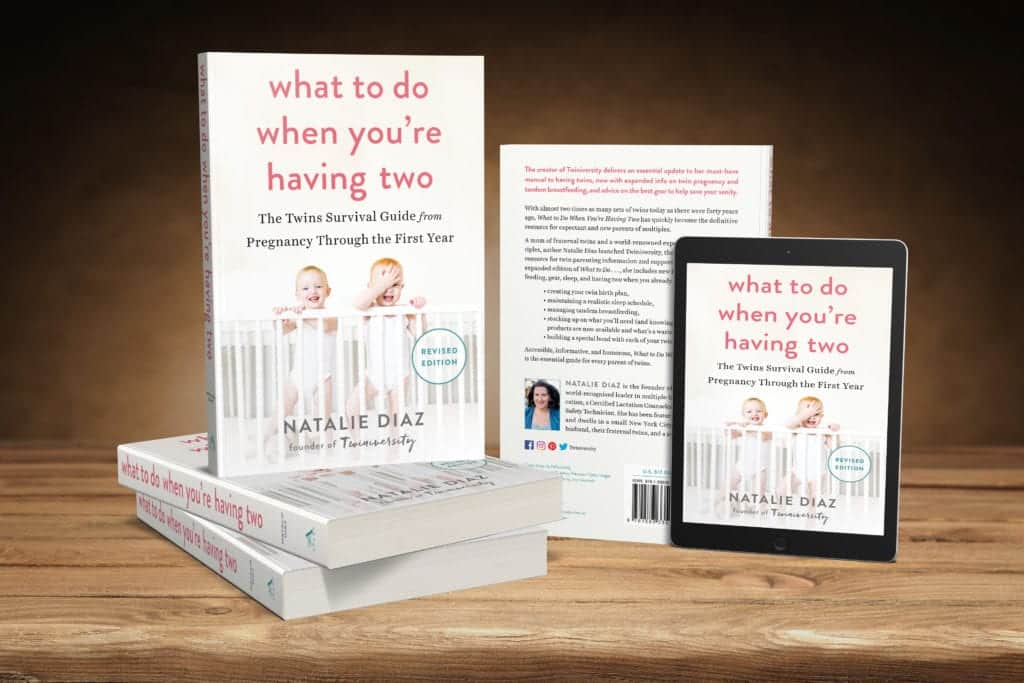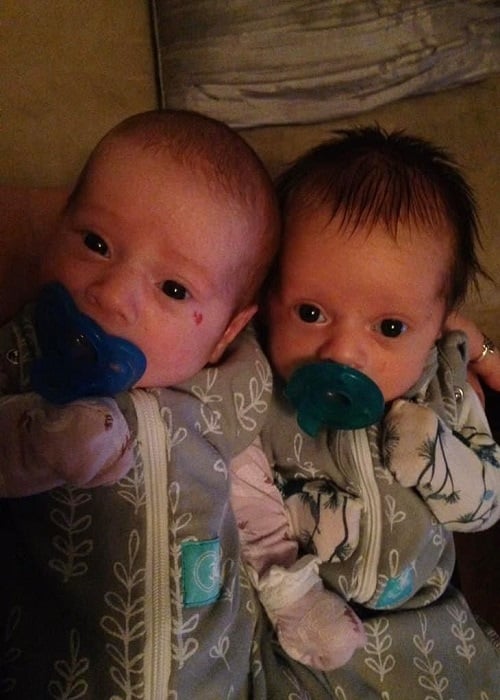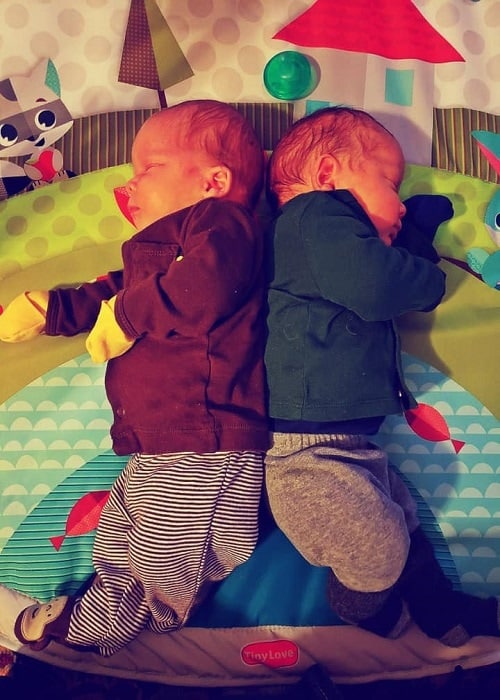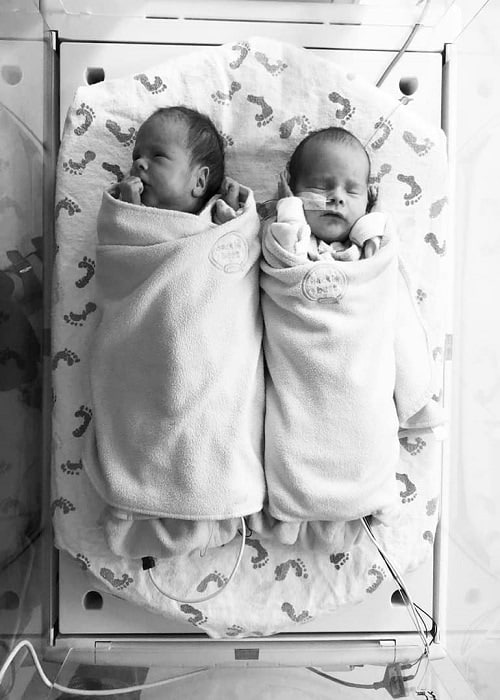Last updated on February 28th, 2024 at 09:14 pm
Learn what to expect with your infant twins week 4, including tips, tricks, and advice from real twin parents who have been there.
All content on this website, including medical opinion and any other health-related information, is for informational purposes only and should not be considered to be a specific diagnosis or treatment plan for any individual situation. Use of this site and the information contained herein does not create a doctor-patient relationship. Always seek the direct advice of your own doctor in connection with any questions or issues you may have regarding your own health or the health of others.
Your Twins Week 4
Welcome back returning twin parents! Hello and welcome to the new twin parents who are just finding us today!
You made it through your first 3 weeks as a twin parent and your rounding out this first month. We know what a huge accomplishment that is. Little known secret, we knew you could do it!
Now what? Well, this is a good place to start. We have plenty of information and resources to help you navigate twin parenting with your twins week 4.
Our twin parenting tips come from our very own experienced twin parents from around the world! These parents have all been there, done that, and are ready to share their tips and tricks with you.
These first few weeks can be full of excitement, questions, and anxiety. Not to worry, we’ve got your back. We’ve laid out all our best tips, tricks, and advice for twins week 4.
If you feel unprepared for twins, take a Twiniversity Expecting Twins Class! Even if your babies are newborns, our class will be so incredibly helpful to get you on track with your twins.

What to Expect with Twins Week 4
- You’ll still be going through 150 diapers (buy on Amazon) per week for twins (that’s 16-24 diaper changes per day)
- Continue with 8 feedings per day (every 3 hours) unless your doctor is cool with switching to 6 feedings a day (every 4 hours). Make sure you’re feeding your babies at the same time and putting them down to sleep at the same time to keep them together on a schedule. Learn about bottle-feeding here
- Babies are eating typically 2 – 3 oz at each feed in week 4, but if your babies are preemies they may be eating less. Ask your pediatrician what is the appropriate amount for your babies based on their weights.
- Offer more milk than you think your baby will drink. There should be a little left in the bottle at the end of each feeding so you can be sure they are getting enough. Note that babies have tiny tummies and can’t manage more than 2 – 3 oz in one sitting at this time.
- If your babies are generally alert, waking to be fed, have good skin color and tone, and are having at least 6-8 wet diapers per day, they should be doing fine.
- Reasons to call the doctor ASAP: If either of them are lethargic, listless, pale, have bowel movements less than once a day, they pass small dark feces after 5 days old, or their skin becomes more yellow or remains wrinkled after the first week
- You can continue your attempts at tandem breastfeeding (buy on Amazon) but keep in mind that newborn babies tend to do better at tandem feeding once they have mastered feeding on their own. Keep trying to tandem feed but don’t stress if it takes a few weeks for your babies to get the hang of it. Read about tandem breastfeeding here
- If you’re breastfeeding, make sure you’re pumping (buy on Amazon) after each feeding for 15-20 minutes tops to empty your breasts. This will help to establish your milk supply. Once your supply is well established (typically by 4-6 weeks) you can stop pumping on a schedule. Read more about pumping here and take our Online On-Demand Breastfeeding Twins class to learn all the basics you need to know.
- Your babies’ umbilical cord stumps will be falling off soon. Once they do you can switch from sponge baths to regular baths. Make sure to only bathe one baby at a time for safety. Learn more about bathing your twins here
- You may need to start trimming their nails with baby scissors or baby clippers. Baby nails can become razor sharp so keep up with this. 20 tiny digits are a lot to manage so enlist help from another adult to get this done as quickly as possible.
- Your babies will start being more alert during the day and less sleepy, but they will still sleep a LOT. Babies this young sleep 16 – 18 hours a day.
- Your babies should be placed to sleep on their backs on a firm, flat surface with only a tightly-fitted crib sheet. No blanket, no toys, no bumpers, no flat sheets. You baby should wear a swaddle blanket or wearable blanket for warmth and comfort. Do not sleep your babies on an inclined surface (learn why here). Following these recommendations will greatly reduce the risk of SIDS and accidental suffocation. Learn more about SIDS here.
- Babies can’t regulate their own body temperature until they are much older, so it’s important to check that they are not too hot or cold. Your twins should wear roughly the same amount of clothing as you, plus one extra layer. Aim for a bedroom temperature of around 68 degrees F, which is just right for babies and reduces the risk of SIDS.
- Diaper rash. It’s inevitable. Learn how to deal with diaper rash here
- Dress your twins in a swaddle blanket for sleep, which will keep them warm and safe in the crib while providing the comfort and security of the swaddle. Learn more about swaddling here
- Tummy time during the daylight hours. Aim for a few minutes a few times a day after feedings. Read more about tummy time here
- Your babies will start to interact with you more. Find short times during the day (5-10 minutes) to start basic “play” with your twins. Gentle clapping games (patty-cake), tickling games, peek-a-boo, and showing your babies toys are great ways to start playing. Very young babies find boldly contrasting images and geometric shapes to be very stimulating so start shopping for toys like that. Buy on Amazon here
- Pediatrician appointments continue. You’ll probably visit their office 1-2 times in the next month to make sure they are gaining weight and developing well. Reminder that twins = two co-pays for each doctor’s visit.
- You’ll be getting tons of advice from everyone by now. You do not have to take all of it. Or any of it! Practice the “smile and nod” and then go do whatever you want (as long as it’s safe.) Everyone else already had their turn. Now it’s YOUR turn. These are YOUR babies — never forget that.
- Cradle cap: what is it? Learn more about cradle cap here
- Expect each baby to cry for 1-3 hours a day. If they cry much more than that, they may have colic. Read more about colic here
- You partner may be going back to work soon, leaving you alone with the twins for the first time. Don’t panic! Read about handling your first day alone with twins here
- Have you started leaving the house at least once a day with your twins? If not, make it a goal for this week. You don’t have to go far — around the block is enough. This will do wonders for your mental state! Learn more about getting out of the house with twins here
- You may notice your babies becoming more irritable and harder to soothe. Investing in two good baby carriers, swaddle blankets, a sound machine, a baby swing, and lots of pacifiers will really help calm your babies down. Learn more about how to soothe your twins here
- If you have a c-section, limitations will be placed by your doctor, such as no driving or climbing stairs or heavy lifting. Read more about c-section recovery here
- Postpartum symptoms may continue for a few weeks but if you notice anything wrong, such as high blood pressure, blurred vision, sudden swelling, or just a sense that something is “off”, call your doctor or head for the ER. It could be postpartum preeclampsia. Learn more about what to expect after birth here
- At week 4, your hormones and mood swings should be leveling off. If they aren’t and you’re feeling continued or worsening feelings, you may be suffering from postpartum depression or anxiety. These conditions are more common with moms of twins and you have nothing to be ashamed of. Take it from us — we have been there!! Call you doctor or therapist and make an appointment to be seen. There are psychologists that specialize in postpartum mood disorders — call your medical insurance and ask for a list of providers in your network.
- You will continue to have spotting through the first month postpartum, even if you have a c-section delivery. Be sure to stock up on pantiliners for weeks 3 and 4 (buy on Amazon).
- If you haven’t already, look into joining a local moms of multiples club (aka twin club). Read about local twin clubs here

Want to be the first to know about giveaways, deals, and more just for twin parents? Sign up for the Twiniversity email list! Subscribe today to get emails about giveaways, events, weekly article roundups, and more! Pregnant with twins? We’ll be sending you a weekly twin pregnancy email to keep you on track with your pregnancy to-do list! Click here to learn more… and while you’re at it, check out our Complete Baby Safety Course and Twin Parent Memberships.
Common Concerns From the Moms Who Have Been There With Twins Week 4
- Are my twins eating enough?
- Are my twins gaining enough weight?
- Are my twins being stimulated enough?
- How much tummy time do my twins need?
- How will I bring my twins out alone?
- How can I relieve my twins gas pains?
- How will we manage the cost of raising twins?
- Will my smaller twin catch up?

The Twins Tale Podcast by Twiniversity is an intimate look into the lives of twin parents and their twins at all ages and stages, from birth through college. We interview twin parents in the trenches and ask all the burning questions you want to know about raising twins: schedules that work, feeding your twins, getting out of the house, finding sanity, and so much more. Subscribe for FREE today!
Milestones & Developmental Leaps Parents Have Noticed With Twins Week 4
What’s going on with development in twins week 4?
- Your babies will be spending more time alert and awake
- Lift their heads during tummy time
- They may have an increase in their appetites
- Your twins may be able to sleep for longer stretches at night. Check with your pediatrician if you need to stick to the strict “every 3 hour” feeding schedule overnight or if you can just wait until one baby wakes up to start the next feeding. It may be too soon to start doing this if your babies don’t yet weigh enough (but keep asking.)
- Your twins will begin to follow sounds
- Your babies may start to mimic your facial expressions
- Your babies may start to make little sounds like “ooh” and “ahh”. Talk to your babies as much as possible to help them start learning the basics of communication.
- Your babies may have more head control in this week
Challenges You Might Experience With Twins Week 4
There are some challenges to look out for with twins week 4
- Feeding your newborn twins at the same time. Read about tandem bottle feedings here and tandem breastfeeding here
- Getting them back to sleep after nighttime feeds. Learn how to survive nighttimes with twins here
- Your babies may be getting fussy throughout the day and night. Read about how to help soothe your fussy babies here
- Lack of sleep. Learn how to get more sleep with twins here
- Babies are still learning to feed and often struggle with gas. Learn how to help soothe gassy twins here
- Managing bathing twins alone. See some twin bathing options for newborns here

5 Tips from Parents of Twins Week 4
Take some tips from experienced twin parents!
- Sleep when you can
- Always be ready to feed immediately when you wake a baby for a night feed (have bottle or breast ready)
- Ask for help and accept it when it is offered. Click here for a printable baby help chore chart to help guest help you
- Keep your mental health in check and reach out for help when needed
- Use grocery pick up or delivery when you can
- Be patient with yourself, your partner, and your twins Read a letter to new moms of twins here
- Track feedings and diaper changes to help you or people helping you stay on a schedule. Click here for a printable twins daily log
- Keep diapers, wipes, and other essential supplies in the room you will be in throughout the day to cut down on trips to the babies room
- Tandem feed if you can to save time. Read on tandem bottle feeding here and tandem breastfeeding here
Personal Advice from Parents of Twins Week 4
“Being home with the twins all day is stressful, even though you’re doing the same thing every day. When your partner comes home, go out alone for a few minutes. Take a drive, walk around the local supermarket. It’s nice to have that time, even if it’s short.”
Dara M.
“Allow yourself to experience all the emotions. Some moments you will feel strong, others you may be a weepy mess. Both are okay, Also, take care of yourself however you see fit. Everyone will tell you how they took care of themselves at this stage. Everyone is different. You’re the one on your journey and you know how to take care of you.”
Ellen F.
“Look after yourself and your babies. Nothing else is important right now. the house, work, or the neighborhood drama can wait until your are functioning on a full nights sleep.”
Jana G.
“Keep all your supplies where you need them at night. Before bed make sure you have wipes, diapers, extra swaddles, etc, in the room where you will feed the twins.”
Tracey D.
“Take a nap everyday. Ignore the laundry and sleep for 30 minutes. Always have 2 changes of clothes per baby when you go out.”
Alyssa M.

Got twins? Us too! The Twiniversity Podcast with Natalie Diaz was created BY parents of twins FOR parents of twins, from your pregnancy days through your twin’s teenage years, this podcast covers it all. It’s all about parenting twins, offering plenty of strategies for making life better, parenting hacks, and, of course, humor. We are laughing WITH you every step of the way.
Questions You Might Have for Your Pediatrician About Your Twins Week 4
Click here for a printable list of doctor questions for twins week 4
- How much and how often should my twins be eating?
- What can I do for my babies congestion?
- Are my twins gaining enough weight?
- How much tummy time do my twins need?
- How can I relieve gas pain for my twins?
- When can we stretch out night feeds?
- How much spit up is too much?
- Is it okay if one twin is gaining more weight than the other?
You Might Want These Items for Your Twins Week 4
- Baby monitors (buy on Amazon)
- Weego twin carrier
- White noise machine (buy on Amazon)
- Tummy time mat (buy on Amazon)
- Baby Brezza Formula Pro Advanced (buy on Amazon)
- Bottle drying rack (buy on Amazon)
- For gas: gripe water (buy on Amazon) or gas drops (buy on Amazon)
- Baby Trend Snap-N-Go Double (buy on Amazon)
- Love to Dream SwaddleUP (buy on Amazon)
- Table for Two
- NoseFrida the “Snotsucker” (buy on Amazon)
- For more recommended baby products, click here
You Might Want These Items for Yourself
- Haakaa manual breast pump (buy on Amazon)
- Twin Z breastfeeding pillow (buy on Amazon)
- My Brest Friend Twin pillow (buy on Amazon)
- Belly oil for pregnancy and postpartum (buy on Amazon)
- Shadow boxes for hospital keepsakes (buy on Amazon)
- Twins monthly milestone baby blanket (buy on Amazon)
- Milestone baby photo cards (buy on Amazon)
- For recommended postpartum recovery products, click here

Daily Schedule Sample for Twins Week 4
A schedule with twins week 4 may seem pointless, but I can assure you, it is not. Following a consistent, but flexible schedule may save your sanity in these first weeks as a twin parent. When you’re outnumbered, organization is key!
Feed your twins every 3 hours, or as instructed by your pediatrician. For example, start the feeding at these times:
- 12 am feed
- 3 am feed
- 6 am feed
- 9 am feed
- 12 pm feed
- 3 pm feed
- 6 pm feed
- 9 pm feed
If your doctor has approved for you to switch to an every 4 hour schedule (only 6 feedings per day), here is what that will look like:
- 12 am feed
- 4 am feed
- 8 am feed
- 12 pm feed
- 4 pm feed
- 8 pm feed
At some point you’ll be able to stop feeding on a schedule overnight and just feed your babies together when one of them wakes up. This will allow you to get MUCH more sleep. Ask your doctor when you can start doing this!
The key to twins is sticking to a schedule, while realizing that things will come up to change the schedule. Take it all one feeding at a time. If one twin wakes up early to eat, wake the other and feed them together.
Always keep the twins feeding together to make sure you get breaks. If they are on opposite feeding schedules, you will never get a break — and you deserve one!
Sleep Advice From the Sleep Lady
Newborn sleep can be tricky to predict, especially with twins. There are some things you can do to help get some shut eye for you and your twins, and ensure some good sleep patterns.
The Sleep Lady, Kim West, LCSW-C recommends: “Night wakings can have many subtle causes, making them tricky to understand and change. In newborns and infants, getting too much daytime sleep and not enough day time feeds can lead to multiple night feedings. Establishing a flexible but predictable feeding schedule during the day can help your baby get more of their ounces when the sun is up.
Look at how often your baby feeds during the day and how many total ounces she is likely getting. Talk to you”r pediatrician about how much your baby is eating and their overall growth to determine when and if they’re ready to drop their night time feeding.”
See more of what The Sleep Lady Recommends about your newborn twins’ sleep here.
When to Call the Doctor
It’s better to overreact 100% of the time than to underreact once.
Natalie Diaz, Twiniversity Founder and Mom of Twins
All content on this website, including medical opinion and any other health-related information, is for informational purposes only and should not be considered to be a specific diagnosis or treatment plan for any individual situation. Use of this site and the information contained herein does not create a doctor-patient relationship. Always seek the direct advice of your own doctor in connection with any questions or issues you may have regarding your own health or the health of others.
Everyone has a different opinion about when to call the doctor. I wanted to call for every sneeze. I often looked to my (more experienced) mother for advice on when to actually call the twins’ pediatrician. She was no help. She told me that they are my babies and NOBODY knows them like I do.
I had to learn to trust my gut. I eventually figured it out, but I’m sure I made several calls when it wasn’t really necessary. So what? That’s what the pediatrician is there for!
That being said, there are a few guidelines to follow. There are a few circumstances under which you should call your doctor and get medical advice. When you call you should have a pen and paper handy and be prepared to give the following information over the phone:
- Immunization records
- Any medications, dosages, and times last taken (even over the counter drugs)
- Medical history
- Your baby’s temperature
- Mention that the baby is a twin, in case of a contagious illness
Any time you see the following symptoms with your twins you should contact your pediatrician immediately.
- Blood in vomit
- Blood in stool
- Seizure
- Suspected poisoning
- Bleeding you cannot stop
- Unable to move
- Limpness
- A rectal temperature of 100.4 or above
- Sleeps more than usual or will not wake up
- Yellow skin or eyes
Call your doctor as soon as possible if one or both of your twins experiences any of the following.
- Refusal to eat for multiple feedings in a row
- Diarrhea or vomiting
- A cold that will not resolve itself or gets worse
- Unexplained rash
- Signs of dehydration (no tears, no wet diapers, sunken eyes, sunken soft spot)
- Ear drainage
- Will not stop crying
When to Call 911
Please note that when you call 911, you and your baby will be taken to the nearest emergency room. This may or may not be located at your preferred hospital.
- Your baby is turning blue or taking more than 60 breaths per minute
- Your baby has a seizure which lasts more than 3 minutes or you cannot reach their doctor by phone immediately
- Suffers from convulsions, unconsciousness, or irregular breathing following a fall or from bleeding
- You think your baby may have a skull, neck, back, or pelvic fracture (DON’T move your baby)
- Your baby suffers from a compound fracture where bone is sticking out from the skin (cover it with a clean cloth and do not touch it)
- Your baby has bleeding you cannot stop after applying pressure for 10 minutes
Again, trust your gut. When in doubt, call and see what your doctor thinks. That’s what they’re there for.
What You Should Read for Twins Week 4
- Diaper Bags for Twins: Packing the Essentials
- Container Baby Syndrome: What is it and how to avoid it
- The Pros and Cons of Twins
- 5 Features Your Baby Carrier Should Have
- Dear Exhausted Mama: A Letter to Moms of Young Twins
Dealing with a NICU Stay
If you’re dealing with a NICU stay for one or both of your babies, make sure to read our NICU resource for parents of twins. Here are some tips for managing the NICU:
- Use the NICU neonatologist as your pediatrician until the twins are ready to discharge from the hospital. The neonatologist is there in the NICU all the time, while the local pediatrician you have selected only gets to visit the NICU maybe once a day and often at hours when you’re not there. Using the NICU neonatalogist will be so much more convenient for you.
- Request the same nurses for day and night shifts so you have some consistency. You can also request your babies to have the same nurse if possible.
- Find out what time the nurses change shifts. If you can’t visit one day, call in the middle of their shift so you don’t catch them at the busy times at the beginning and end of their shifts.
- Pump your breastmilk in the NICU. Most NICUs have a pumping room, hospital grade pumps, a lactation counseling team, and refrigerated milk storage to support your breastfeeding goals. Providing that liquid gold to your preemie babies is one of the best things you can do to contribute to their success.
- Bring snacks and drinks to keep your energy up. They usually have a refrigerator for parents to use.
- Take photos and videos often. You think now that you won’t want to remember this time, but just think how amazing it will be to look back on these in the future and see how far they’ve come.
- For more NICU tips and advice, click here

Need some twin parent friends? Get the support you need with a Twiniversity Membership. Benefits include a monthly twin parent club meeting on Zoom, access to a private Facebook group just for twin parents, and a video library of twin parenting lessons. Visit Twiniversity.com/membership to join today!
Don’t Forget to Do These Things With Twins Week 4
This fourth week probably still feels like a bit of a blur, though you’re probably starting to get your bearings a bit. It gets a little better each week with regards to sleep and routine. We promise! You aren’t alone and we have all been there. This week there are a few things to remember that might help you out a bit.
- Take pictures! You will want these memories years from now. Have your partner take pictures of you with your twins and don’t worry about your hair. You won’t care how you look in these pictures in 16 years. Promise!
- Eat and drink! It’s going to be easy to forget to do this, so plan ahead to have friends/family drop off meals and opt for ready-made meals from the freezer section for quick dinners.
- Keep in close communication with your pediatrician. Don’t be afraid to ask any and all questions. If the staff at the office makes you feel guilty about this, it’s time to find a new provider.
- Make sure you make your postpartum appointment (typically for 6 weeks after birth.) Your mental and physical health is more important than ever right now, and your body is going through daily changes, even still at 1 month postpartum.
- Put on your oxygen mask first! If you don’t take care of yourself first, you won’t be there to take care of your twins.
Are You a New Twin Parent?
Check out Natalie Diaz’s book:
“What To Do When You’re Having Two
The Twin Survival Guide From Pregnancy Through the First Year”

In What to Do When You’re Having Two: The Twins Survival Guide from Pregnancy Through the First Year, national twins guru and founder of Twiniversity (and twin mom herself!) Natalie Diaz provides a no-holds-barred resource about life with twins, from pregnancy and birth all the way through your duo’s first year of life.
Accessible and informative, What to Do When You’re Having Two
is the must-have manual for all parents of twins.
An excerpt from Twiniversity founder Natalie Diaz’s book, “What To Do When You’re Having Two“
New Parent No-Nos
The first step toward surviving the first few weeks with twins is to avoid making the top three mistakes made by new parents of twins. If you do nothing else right, you will be way ahead of the game if you do not commit any of the following sins:
Mistake #1 – Mixing Up Priorities
Right now, your priorities might be finding the perfect color for the nursery wall and a good father’s day gift for your dad. When the babies come, the only priorities you should have are to keep those children safe and fed and to keep yourself (reasonably) clean and nourished. That’s really it. You should not even attempt to do anything beyond that for at least the first several weeks. Putting pressure on yourself to attend family gatherings or to keep the house spotless will only burden yourself unnecessary and take your attention away from what is really important right now.
Photos of Twins Week 4
















Return to the First Year with Twins Home
Sources
- Dr. Ilona Bendefy, Baby: Day by Day
- Dr. Frans X. Plooij and Dr. Hetty van de Rijt, The Wonder Weeks
- Marple, Kate, and Dawn Rosenberg. “When to Call 911: How to Tell If Your Baby Needs Emergency Care.” BabyCenter
- “Newborn Baby: When to Call the Doctor.” Cleveland Clinic
- “Developmental Milestones: 1 Month.” HealthyChildren.org
- “First Month: Physical Appearance and Growth.” HealthyChildren.org
- WhattoExpect.com “4-Week-Old Baby.” What to Expect, 2 Aug. 2019
- “How Often and How Much Should Your Baby Eat?” HealthyChildren.org







